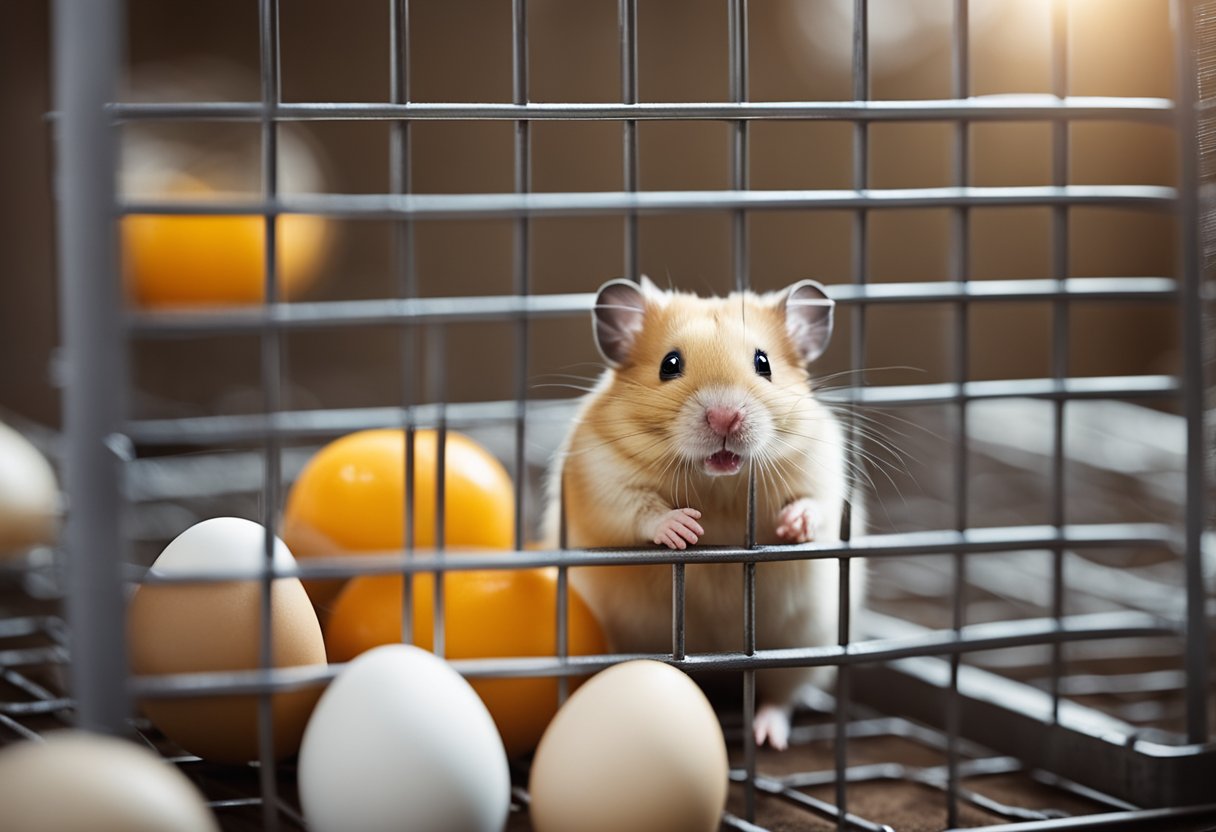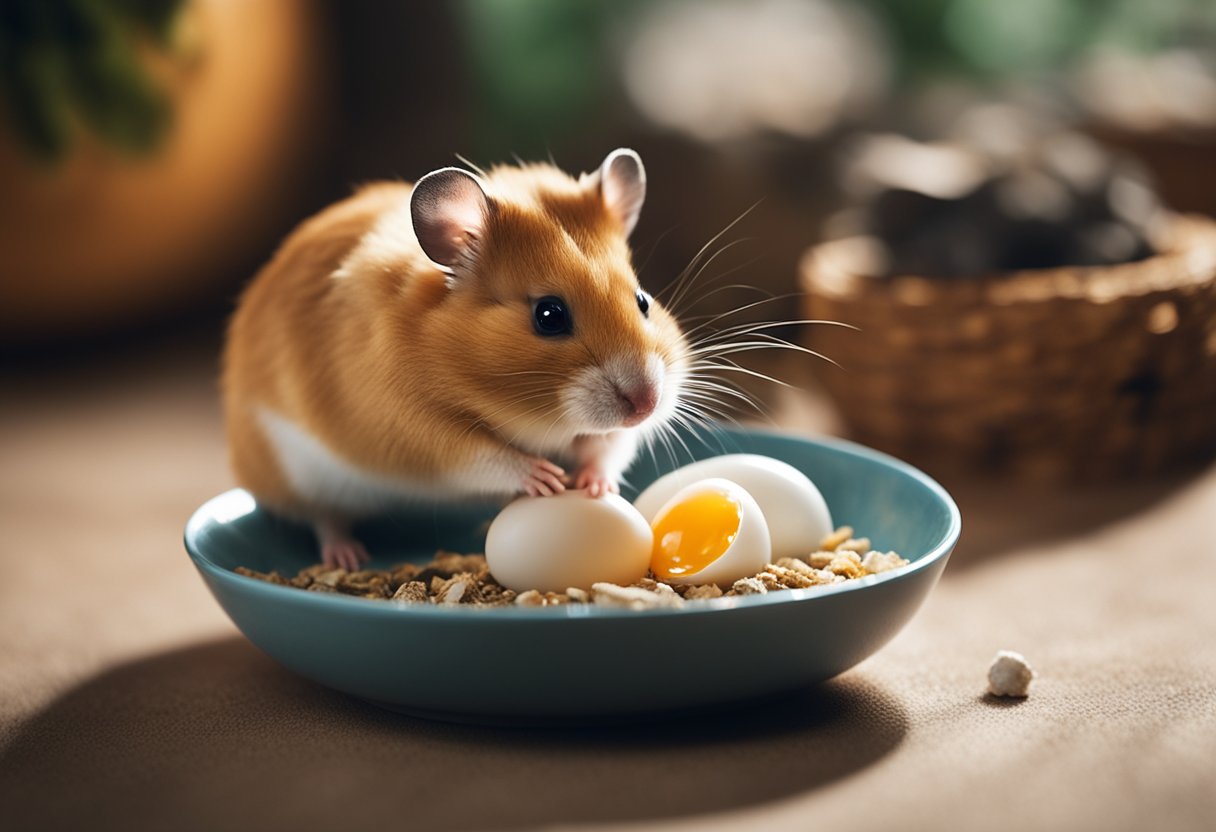Can Hamsters Eat Egg? A Comprehensive Guide to Feeding Your Furry Friend
Hamsters are popular pets that require a balanced diet to maintain good health. As an owner, you may be wondering if it’s safe to feed your hamster eggs. The answer is yes, hamsters can eat eggs, but there are some important things to consider before adding them to your hamster’s diet.

Eggs are a good source of protein and other essential nutrients that can benefit your hamster’s overall health. However, it’s important to feed eggs in moderation and ensure they are cooked thoroughly to avoid the risk of salmonella. In this article, we will explore the nutritional benefits of eggs for hamsters and provide feeding guidelines to keep your furry friend safe and healthy.
Key Takeaways
- Eggs can be a healthy addition to a hamster’s diet when fed in moderation and cooked thoroughly.
- Eggs are a good source of protein and essential nutrients that can benefit your hamster’s overall health.
- To ensure your hamster’s safety, it’s important to follow feeding guidelines and avoid feeding raw eggs.
Nutritional Benefits of Eggs for Hamsters

Eggs are a good source of nutrition for hamsters. They contain a variety of nutrients that are essential for the growth and development of your pet. In this section, we will discuss the nutritional benefits of eggs for hamsters.
Protein Content
Eggs are a good source of protein for hamsters. Protein is an essential nutrient that is needed for the growth and repair of tissues in the body. Hamsters need protein to build and maintain muscle mass. According to a source, a large egg contains about 6 grams of protein. However, it is important to note that hamsters should not consume too much protein as it can lead to health problems.
Vitamins and Minerals
Eggs also contain a variety of vitamins and minerals that are essential for the health of your hamster. According to a source, eggs contain vitamin B12, vitamin D, and selenium. Vitamin B12 is important for the proper functioning of the nervous system, while vitamin D is important for the development of strong bones. Selenium is an antioxidant that helps to protect cells from damage.
In addition, eggs also contain riboflavin, which is important for the proper functioning of the liver, and vitamin A, which is important for eye health. However, it is important to note that hamsters should not consume too much vitamin A as it can be toxic in large amounts.
Overall, eggs can be a good addition to your hamster’s diet. However, it is important to feed them in moderation and to monitor your hamster’s health closely. According to a source, it is recommended to feed only 2-3 small bites of scrambled egg once or twice a week at most. An optimal hamster diet consists mainly of quality commercial hamster food, supplemented with some seeds, vegetables and occasional fruits.
Feeding Guidelines and Safety

When it comes to feeding eggs to your hamster, there are a few guidelines you should follow to ensure their safety and health. Here are some important things to keep in mind:
Appropriate Egg Forms and Preparation
According to Hamster Care Net, hamsters can eat boiled, scrambled, or cooked eggs. Raw eggs should be avoided as they can contain salmonella and other harmful bacteria that can make your hamster sick. It is best to cook the eggs thoroughly before feeding them to your furry friend.
Portion Size and Frequency
While eggs can be a healthy addition to your hamster’s diet, they should be given in moderation. Pets Food Safety recommends that hamsters should only be given eggs as an occasional treat and not as part of their regular diet. It is best to feed only 2-3 small bites of scrambled egg once or twice a week at most, as recommended by Hamster Care Tip.
Potential Risks and Allergies
It is important to monitor your hamster’s health and behavior after feeding them eggs. If your hamster experiences diarrhea, vomiting, or any other unusual symptoms, stop feeding them eggs and contact your veterinarian. Additionally, some hamsters may have allergies or sensitivities to eggs, so it is important to introduce them slowly and watch for any adverse reactions.
By following these guidelines, you can safely incorporate eggs into your hamster’s diet and provide them with the nutrients they need to stay healthy and happy.
Resources

If you’re a new hamster owner, you might have questions about what your hamster can and cannot eat. One common question is whether hamsters can eat eggs. Fortunately, the answer is yes! Eggs can be a nutritious addition to your hamster’s diet, but it’s important to feed them in moderation and cooked thoroughly to avoid any potential health risks.
Here are some resources to help you learn more about feeding eggs to your hamster:
- Chef’s Resource provides a comprehensive guide to feeding eggs to your hamster. They recommend feeding eggs in moderation and cooked thoroughly to avoid any potential health risks. They also suggest maintaining a varied and balanced feeding regimen to meet your hamster’s specific dietary needs.
- Hamster Care Tip offers a vet’s guide to feeding eggs to your hamster. They recommend feeding only 2-3 small bites of scrambled egg once or twice a week at most. They also suggest introducing eggs slowly and monitoring your hamster’s droppings and weight closely.
- Animal Notebook explores whether hamsters can eat eggs, the benefits and potential risks, and how to introduce eggs to their diet. They suggest providing eggs as a treat and not a staple food in your hamster’s diet. They also recommend consulting with a veterinarian if you have any concerns about feeding eggs to your hamster.
By following these resources, you can ensure that you’re feeding your hamster a healthy and balanced diet that includes eggs in moderation. Remember to always consult with a veterinarian if you have any concerns about your hamster’s diet.
Conclusion

In conclusion, hamsters can safely enjoy eggs as a treat or supplement to their regular diet. Eggs offer a valuable source of protein, essential amino acids, and vitamins that can benefit the health of hamsters.
When feeding your hamster eggs, it is important to remember to never give them raw eggs as salmonella can make them sick. Always cook the eggs well before feeding them to your hamster.
Hamsters should only be offered small amounts of plain boiled or scrambled eggs as a treat instead of a primary food source. It is important to ask your vet to help you determine how much food your hamster should eat each day.
Overall, by offering a combination of pellets, fresh fruits, vegetables, and whole grains, hamsters can enjoy a varied and balanced diet that includes the occasional treat of eggs.
Frequently Asked Questions

Is it safe for hamsters to consume boiled egg yolk?
Yes, boiled egg yolk is safe for hamsters to consume. Boiled egg yolk is an excellent source of protein, vitamin A, and healthy fats that can help support a hamster’s overall health.
Are scrambled eggs a suitable food for hamsters?
Yes, scrambled eggs are a suitable food for hamsters. Scrambled eggs are a great source of protein and can provide some nutritional benefits for hamsters. However, it’s important to make sure the eggs are cooked thoroughly and given to the hamster in small portions.
Can I feed my hamster egg whites without any risks?
No, it is not recommended to feed your hamster egg whites. Raw egg whites contain avidin, which can bind to biotin and prevent its absorption, leading to a biotin deficiency in hamsters. Biotin deficiency can cause skin and coat problems, as well as other health issues.
Should egg shells be included in a hamster’s diet?
Eggshells can be included in a hamster’s diet as a source of calcium. However, it’s important to make sure the eggshells are thoroughly cleaned and crushed into small pieces to prevent choking hazards.
Is it dangerous for hamsters to eat raw eggs?
Yes, it is dangerous for hamsters to eat raw eggs. Raw eggs can contain harmful bacteria such as Salmonella, which can cause serious health problems for hamsters.
What are the potential hazards of feeding fried eggs to hamsters?
Fried eggs are not recommended for hamsters as they are high in fat and may cause digestive issues. Additionally, the oil used to fry the eggs may be harmful to hamsters if consumed in large amounts.
Remember to always feed your hamster eggs in moderation and as part of a balanced diet. If you have any concerns about your hamster’s diet, consult with a veterinarian.
